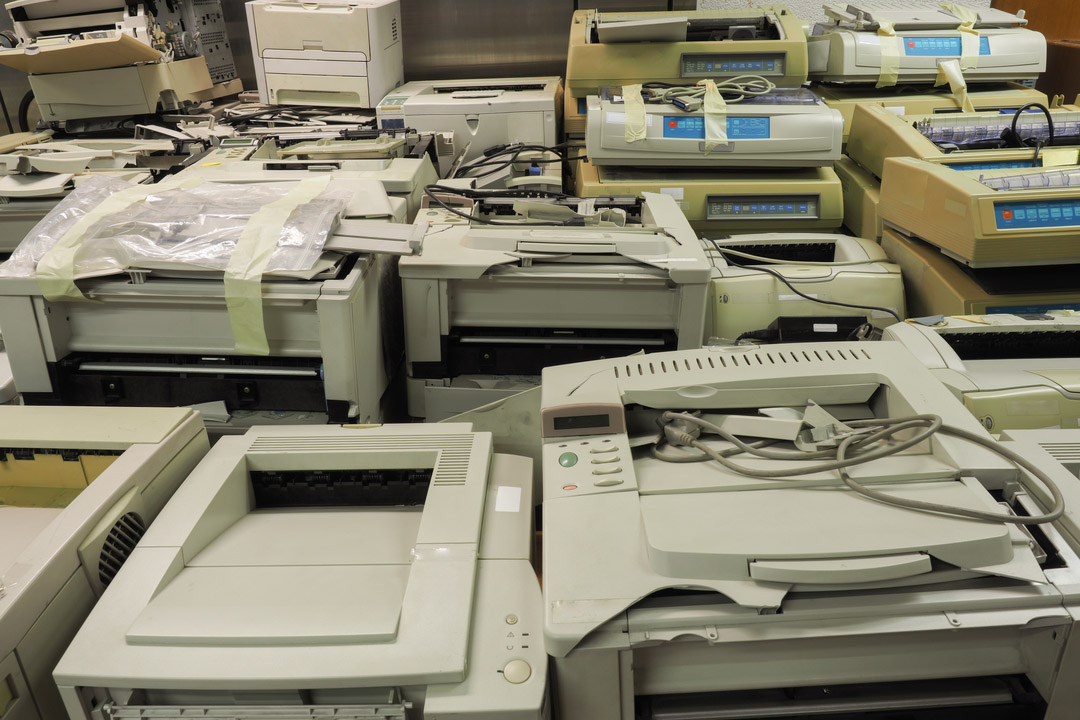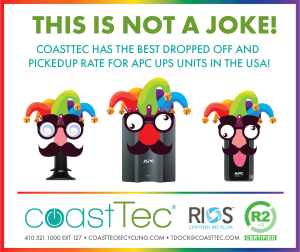
The president of eGreen IT Solutions, Karin Harris, argues that her company should have been alerted after BAN determined it sent a printer to an unapproved immediate downstream processor. | KG Design/Shutterstock
Arizona-based eGreen IT Solutions was stripped of its e-Stewards certification after GPS trackers showed overseas printer shipments. The company says it did not “knowingly” break rules.
The e-scrap processor was found to have two critical non-conformities and other violations of the e-Stewards standards, leading to the withdrawal of its certification.
The decision came after the Basel Action Network (BAN), which administers the e-Stewards Certification Program, investigated the company using GPS trackers. A follow-up investigation revealed other violations of the standards, according to an evidentiary report.
Karin Harris, president of eGreen IT Solutions, told E-Scrap News that the company has been certified with e-Stewards for 12 years and “we did not knowingly or intentionally violate the e-Stewards Standard.” She added that she feels the company is being “unfairly scapegoated” and that she has always promoted the use of trackers to ensure proper e-scrap disposal.
“We believe that it is important to work together with industry stakeholders and certification bodies to ensure that responsible e-waste management practices are being followed,” she said in a statement. “We acknowledge that there were issues with our downstream provider, and we regret that these issues resulted in the withdrawal of our e-Stewards Certification.”
Material ends up in Southeast Asia
In 2021, BAN fitted two computer printers with internal GPS trackers and delivered them to eGreen IT Solutions. The two printers went from eGreen in Phoenix to Olgin Efune Recycling Company (OERC) in the same city, then to California locations, before one ended up in the Philippines and the other in Malaysia.
The report noted that eGreen spent 20 months trying to approve OERC as an immediate downstream processor but was shipping printers to them prior to approval, “and at least by 7/4/22 knew OERC exported printers to Malaysia.”
The report also laid out data security concerns.
BAN withdrew eGreen IT Solutions’ e-Stewards license for a minimum of two years as of March 2, 2023. After March 2, 2025, the company can reapply for certification.
Harris said she and her company “remain committed to promoting environmentally and socially responsible e-waste management practices. We hope that we can work together with BAN and other industry stakeholders to address any concerns and continue promoting responsible e-waste management practices.”
She added that she will be maintaining eGreen’s ISO 14001 and NAID AAA certifications “and will continue to work towards meeting the requirements of the e-Stewards Certification Program without the ‘certificate.'”
Investigation details
Documents eGreen sent BAN as part of the investigation included requests on March 20, 2021, and July 4, 2021, to add OERC as an immediate downstream provider. The company also sent outbound reports noting that 1,982 pounds of printers were shipped directly to OERC as early as June 10, 2021, and at least through Dec. 13, 2021, despite the lack of approval.
“Sixteen months after beginning their IDP approval process, eGreen still had not approved OERC, but could see that printers were being ‘shipped as is’ to Malaysia,” BAN’s evidentiary report stated.
The second printer ended up in a Malaysian greenspace and was still signaling as of May 2022, the report noted.
eGreen’s downstream disposition chart did not indicate that any printers were being transferred to OERC or exported out of the U.S., but rather listed OERC as the end of the recycling chain for eGreen’s ferrous and non-ferrous materials only, the report states.
Another concern for BAN is data security, because OERC stated in its eGreen Downstream Provider Questionnaire that they shipped printers “as is” to Port Klang West in Malaysia and eGreen did not provide evidence to BAN that it sanitized data or ensured that OERC sanitized data.
BAN said the contract with OERC was also “wholly inadequate” and appeared to be based on an old version of the e-Stewards Standard. A late February 2022 formal audit had flagged a non-conformity for downstream due diligence, stating that initial due diligence and subsequent annual desk audits could not be located for nine downstream providers, but that issue was eventually closed out with a plan.
The report noted that eGreen was given multiple opportunities to provide countering evidence and explanations.
Harris said she did not intend for the printers to be sent to OERC prior to their approval as an immediate downstream provider and it was an internal misunderstanding. She added that she feels BAN was more focused on scapegoating and publicly shaming eGreen than working to fix the problem.
“While we understand the concerns raised by BAN regarding the export of our materials to unapproved Immediate Downstream Providers and ultimately to locations outside of the United States, we believe that our company is being unfairly scapegoated in this situation,” she said.
She said she would have liked for BAN to alert her after the first printer was tracked to an unapproved location so she could have prevented the second printer from also being shipped overseas.
“We were alerted by the certifying body of this when remedying the situation was too late of an option,” Harris said. “We believe this matter could’ve been handled more professionally, not only by our parties involved but also with the certifying body who worked more to publicly castigate than to empower a decade-long e-Stewards partner.”
More stories about Certification Standards
- Processor responds to e-Stewards eligibility suspension
- Citing Basel, Illinois processor launches e-plastics line
- e-Stewards, Bloom release electronics ESG calculator



